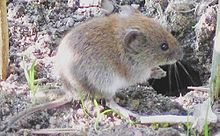vole
From Wiktionary, the free dictionary
From Wiktionary, the free dictionary

Borrowed from Norn vollj, from Old Norse vǫllr (“field”), from Proto-Germanic *walþuz (“forest”). The Orkney dialectal term vole mouse, lit. “field mouse”, was introduced to general English by George Barry in 1805; John Fleming in 1828 was first to refer to the creature by the epithet vole alone. Displaced earlier names for these species which also classified them as mice, e.g. short-tailed field mouse.
| Audio (Southern England): | (file) |
vole (plural voles)
|
Note: There is a systematic error in the entries below. "Vole" refers to hundreds of small rodent species living in all kinds of habitats. Many, but probably not all, of the translations refer to the "water vole", which is just one of the many species. When translating "vole" into other languages, one should look for words that refer to the voles as a group. Further details can be found on the Wikipedia articles on vole and on many of the species.
|
vole (plural voles)
vole (third-person singular simple present voles, present participle voling, simple past and past participle voled)
Part or all of this entry has been imported from the 1913 edition of Webster’s Dictionary, which is now free of copyright and hence in the public domain. The imported definitions may be significantly out of date, and any more recent senses may be completely missing.
(See the entry for “vole”, in Webster’s Revised Unabridged Dictionary, Springfield, Mass.: G. & C. Merriam, 1913, →OCLC.)
From Middle High German vol, voll, from Old High German foll, from Proto-Germanic *fullaz. Cognate with German voll, Dutch vol, English full, Icelandic fullur.
vole (comparative völler, superlative völlscht)
Seamless Wikipedia browsing. On steroids.